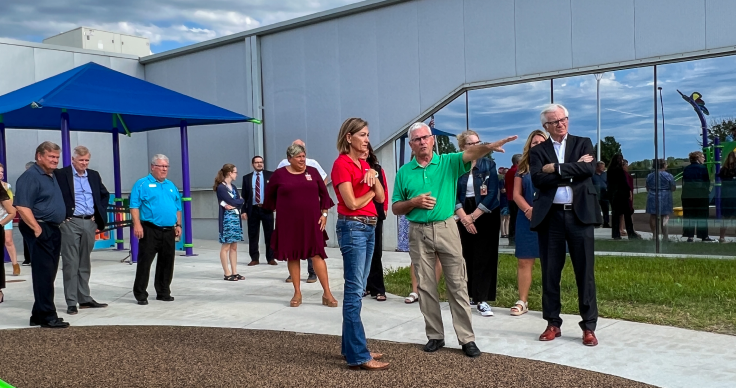“It needed a village approach. Our community based solution interprets and knits together both the needs of local child care providers and that of employers.”
– Dave Lyons, Strategic Initiatives Consultant, Greater Dubuque Development Corporation
Background: Lack of Child Care Challenges Business Growth
In 2018, the Greater Dubuque Development Corporation (GDDC) identified child care as a key issue in data from their annual survey of more than 300 local businesses. The GDDC, an organization that supports businesses and economic prosperity by promoting growth and innovation in Dubuque, Iowa, identified two key challenges facing their partners: First, finding and recruiting talent. Second, the scarcity of child care options that made finding and retaining talent even more difficult.
By 2019, the GDDC formed a coalition with the Dubuque Chamber of Commerce, Child Care Resource and Referral, Dubuque County Early Childcare and Northeast Iowa Community College to tackle the challenge. Together, they advocated for new child care policies and began designing, funding and supporting child care infrastructure in Dubuque Industrial Park West and across the county.
Solutions: Data-Driven Collaboration Expands Infrastructure
The first few years were focused on policy and budget planning to support child care providers and families. Then, in 2022, they set out to measure the extent of the problem.
Surveys Reveal Barriers for Employers and Child Care Providers
In 2022, the coalition conducted surveys across local businesses and child care centers. Results showed that employers struggled with:
– Infant care availability
– General access and cost
– Coverage for nontraditional and shift workers
Meanwhile, child care providers wanted to expand services but faced staff shortages and funding limitations.
Employer-specific needs assessments revealed that up to 40% of workers had considered quitting or reducing hours due to lack of child care, illuminating the impact child care benefits have on productivity and profits.
Grant Opportunities Catalyze Action
When Iowa launched the Child Care Business Incentive Grant Program in 2022, Dubuque Initiatives quickly responded. They identified the Dubuque Community YMCA as a provider partner, secured employer sponsorships and submitted a grant proposal to build a child care center in the industrial park. But soon after, they discovered a more collaborative approach was needed. Initial outreach showed that while business leaders supported the project in theory, many were hesitant to manage or fund child care directly. Despite understanding the return on investment, they lacked confidence in navigating child care operations. In response, GDDC revised the model to emphasize shared investment without any operational responsibilities for individual businesses.
Bright Minds Child Care Center: A Shared Solution Becomes Reality
In 2023, the Dubuque Child Care Collaborative (DCC) formed to lead the effort. With funding through a blend of state grants and private-sector pledges, the coalition renovated a former call center in Dubuque Industrial Park West into the Bright Minds Campus: a modern facility featuring 10 classrooms and 120 child care slots, including space for 36 infants.
Wraparound Preschool Care Adds Flexibility
Once the child care center was in place, the DCC used the collaborative community model and needs assessments to inform their next phase. Through a partnership with Dubuque Community School District, the Seedlings Preschool Center was built next door, offering wraparound care before and after half-day preschool. A joint-hire model gives teachers the opportunity to extend their hours, providing continuity for children and additional income for teachers.
Wage Enhancement Fund Sustains Progress
To address workforce concerns and avoid disrupting other centers, the DCC launched the Business Champions for Child Care Fund in December 2023. With employer contributions between $5,000 and $600,000, the group secured more than $800,000 in local investment and $560,000 in additional state funding.
The fund helps recruit and retain child care educators across the community, not just at Bright Minds. It also incentivizes continued investment by offering priority enrollment at Bright Minds to employees of participating companies. So far, it has helped create 144 additional child care slots and hire 38 new early childhood educators in the county.
Results: A Community Model for Child Care Investment
All told, Dubuque’s community-based approach has generated measurable impact, including:
– $4.3 million in infrastructure grants and donations
– $1.5 million for workforce and system supports
– Over 30 public and private sector partners
– 120 child care slots at Bright Minds
– 144 additional community slots
– 38 new educators
The DCC’s work to add capacity and to train and attract new child care professionals in Dubuque County continues, with an estimated 412 slots to open in 2025.
Advice for Business Leaders
Don’t Make Assumptions
“Really listen to your stakeholders to uncover their nuanced needs,” said Nicolas Hockenbury, GDDC’s director of workforce programming. “Our first proposals flopped because we made assumptions about what employers and child care providers needed.”
Needs assessments and data helped reveal sustainable, high-impact strategies. “Our model has had the greatest community impact and is the least complicated for employers,” he said.
Continue Collaborating
“The Bright Minds facility met an immediate child care need, but the ongoing collaborative approach is what has created a roadmap for future success,” said Dave Lyons, strategic initiatives consultant to the GDDC. “It’s allowed the entire community to come together to respond to the child care crisis – and it’s working.”

